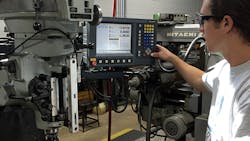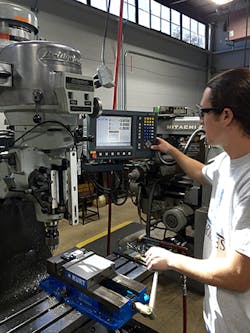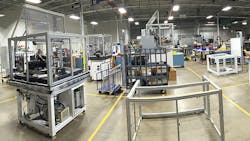Beyond Skills, Precision Manufacturing Needs Passion
The “skills gap” is a real and persistent problem that manufacturers have been working to address for much of the past decade: new accreditation programs, expanding training curricula, and updated certification standards have had some positive effects in filling the gap. But those approaches are based on addressing manufacturers’ needs, emphasizing employment opportunities and other practical advantages. Addressing the issue from the employees’ point of view may require more “passion.”
Glebar Co. is a manufacturer that is tuned to these types of issues: it is a precision manufacturer that designs and builds high-tech machinery for use by precision manufacturers.
Ramsey, N.J.-based Glebar designs and builds modular CNC machining systems for grinding, micro-grinding, and profile metrology (gauging) systems, for machine shops and other fabricators. Glebar knows its customers’ concerns — and many of those are its own concerns, too.
Over the past several months Glebar has been seeing its skills gap narrow thanks to the passionate approach to machining processes shown by a 26-year-old who is new to the profession, and right at home.
“A few weeks into working at Glebar I was asked to do a refurbishing job,” Matt Behre recalled recently. “A customer needed to replace worn sleeves inside the bores of several
tubes that were a part of some type of manifold. This required boring out the old sleeves and pressing in new ones. Extracting the old ones and maintaining the original I.D. within tolerance wasn't too bad, but turning and boring the new sleeves with a required 0.010-in. wall thickness got tricky fast.
“To machine these replacement sleeves I used sharp tools and patience, and about an inch and a half of extra material on top of what was allotted – yikes!” he recalled. “It wasn't easy to do this replacement, but I enjoyed seeing it all come together in the end. It felt good.”
Behre grew up in Highland Lakes, N.J., about 30 miles from where Glebar’s designs and builds its name-brand machinery. He enjoyed woodworking in high school, proudly recalling he built two electric guitar bodies, and he went on to New Jersey’s Hohokus School of Trade and Technical Sciences to work on “things” and solve problems with his hands.
“I originally went to school to be a welder,” he recalled. “Trade school opened my eyes to the rewards a career in the machine shop could bring. As work in the weld shop got slow at my first job, I was asked to work alongside the tool maker there, who showed me a few tips and tricks. Since then I've learned so much from skilled and older machinists, (and) yet still learn new techniques and processes all the time.”
Now, he’s showing the result of what he’s learned — and demonstrating some of his own passion, too.
“I'm a machinist,” he stated now, plainly, with confidence and satisfaction. “Various machining tasks are assigned to me to complete throughout the day. Many times the type of work I do is either unpractical to do in a CNC machine, because of the small amount of pieces needed in that order, or just more simple to do on a manual machine.
Impressive debut
“I run a Hardinge tool room lathe and a Bridgeport milling machine for most applications during the day,” Behre continued, describing the work at hand. “The types of pieces I make are anything from machine parts for our product line to prototype pieces for our engineers.” His aptitude for the work was apparent to early on to his Glebar supervisors.
“What impressed me the most from Matt was how he handled the interview process,” recalled Ed Agar, production manager. “During our interview process we would have potential candidates review a few drawings and let them tell us how they would machine a particular part. We had already interviewed five people and the results were not looking promising. But when we showed the prints to Matt, he asked for a pen a paper and drew out what steps he would take and what tools he would use … Pretty impressive for someone with only a few years’ experience.”
And, Behre appreciates the opportunities that machine-part design and manufacturing offer, to ignite his curiosity and to expand his talents. “Glebar in particular is a great place for a growing machinist to practice his trade because the kind of work assigned varies so frequently; it really gives me a chance to hone my skills.
“If there’s one piece of advice I can give to those considering or just entering the profession, is to soak it all up, listen and mimic as much as you can.”
More than that, Behre is aware of the broader issues at work around him, and developing through him. “I take pride in purchasing U.S.-made products when I can,” he said. “Making machines in the U.S. is something to feel proud of…”
He is pleased, too that his own enthusiasm and respect for the work and workplace is reciprocated by his Glebar colleagues.
“Tools and inspection equipment are always at hand and their whereabouts are well managed,” he said. “Above all, I have helpful coworkers. Any questions I have about a job in the shop are easily explained by our professional experienced staff, and all of my superiors are reachable, working right alongside of us in the shop, and I never have to look far to find out what my next assignment will be. Our foreman is always able to get us on a new task as soon as we finish one up.”
Machine shop manager Dennis Schear said Matt has a “‘built in’ work ethic, a perfect fit for one that aspires to become a machinist.
“He looks forward to each day knowing he will learn, and be challenged with new parts to make,” Schear continued. “He also has a natural desire to see firsthand the ‘tricks of the trade’ his experienced co-workers will show him. Matt has now worked under my supervision for only two months. I knew from my first interview he was a great fit for our needs.”
And while Behre has fulfilled every expectation, Schear added that soon he would be exceeding them. While aptitude and enthusiasm may be two qualities helping to fill the manufacturing skills gap for Glebar – there is one more that Behre recommends.
“Patience … For example, a situation that requires a bit of patience is when parts from other departments arrive for further machining operations after hours of work or finishing has been put into them,” he said. “Taking a little extra time setting up these machining jobs is a much better bet than losing the time spent so far on the job, rushing the setup and making scrap. Patience is key.”
Manufacturers are growing more aware of the great responsibility before them, to fill the gaps in their ranks with talented and resourceful workers and future technicians. Developers like Glebar are filling in the missing elements, identifying and engaging the potential of young people with a passion for machining.


